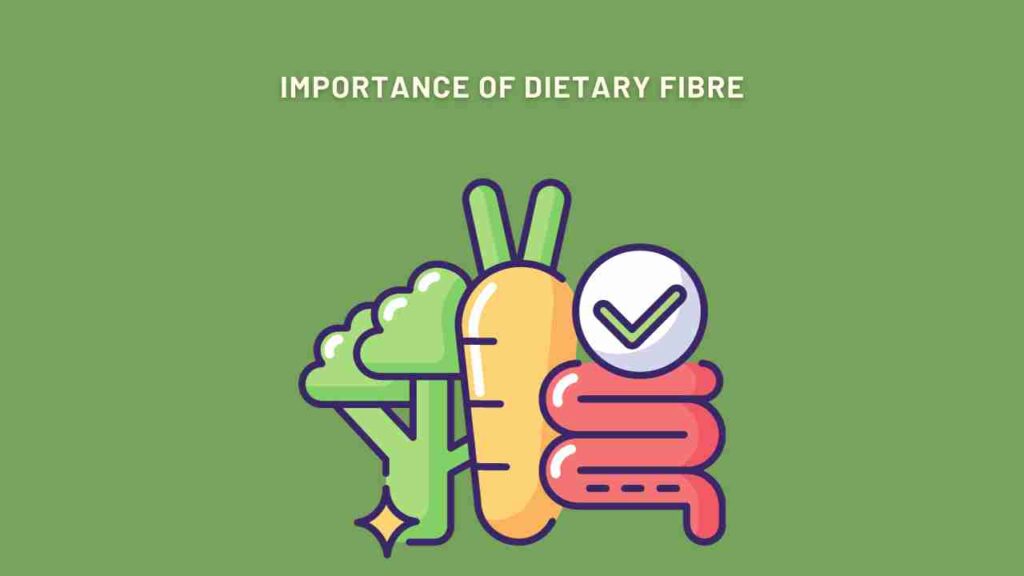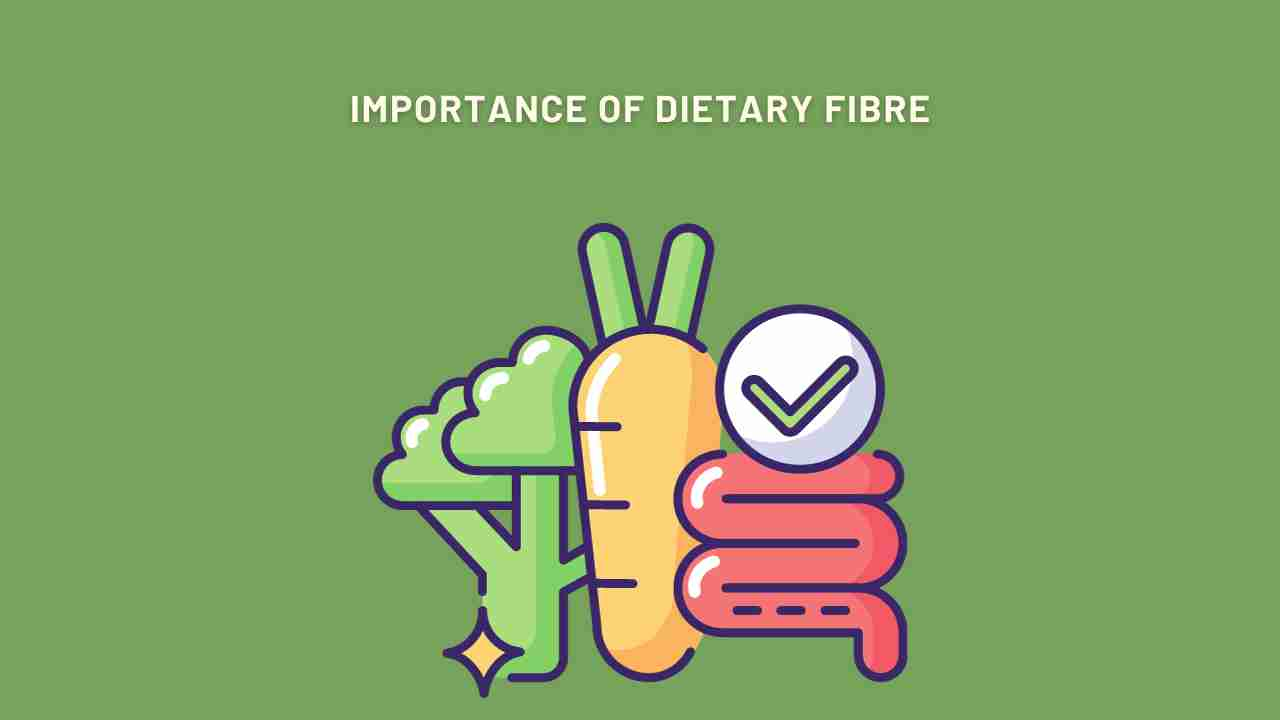Dietary Fiber is a class of complex carbohydrates derived from plant-based sources. It encompasses two main types: soluble and insoluble fibers. Soluble fibers, found in foods like oats and legumes, dissolve in water, forming a gel-like substance. On the other hand, insoluble fibers, abundant in whole grains and vegetables, remain unchanged as they pass through the digestive system.
Exploring the Rich Sources of Dietary Fiber
1. Whole Grains:
Whole grains stand out as a powerhouse of Dietary Fiber. Foods such as quinoa, brown rice, and whole wheat products contribute significantly to your daily fiber intake. Not only do they enhance digestive health, but they also provide a sustained release of energy.
2. Fruits and Vegetables:
Nature’s bounty, in the form of fruits and vegetables, offers an abundance of Dietary Fiber. Incorporating a colorful array of fruits and vegetables into your diet ensures a diverse range of fibers, promoting optimal gut health and overall vitality.
3. Legumes and Pulses:
Beans, lentils, and peas are not only excellent sources of protein but also pack a punch in terms of Dietary Fiber. Their inclusion in your meals provides a wholesome nutritional boost, fostering a balanced and fiber-rich diet.
The Significance of Dietary Fiber for Health and Wellness

1. Digestive Health:
Dietary Fiber plays a pivotal role in maintaining digestive health. Insoluble fibers add bulk to stool, preventing constipation and promoting regular bowel movements. Meanwhile, soluble fibers support a healthy gut microbiome, contributing to overall digestive well-being.
2. Weight Management:
For those on a quest for effective weight management, Dietary Fiber proves to be a valuable ally. High-fiber foods provide a sense of satiety, curbing unnecessary cravings and promoting weight loss by aiding in calorie control.
3. Blood Sugar Regulation:
Soluble fibers exhibit the remarkable ability to regulate blood sugar levels. They slow down the absorption of sugar, preventing rapid spikes and crashes, making them a crucial component for individuals managing diabetes or striving for stable energy levels.
4. Heart Health:
In the pursuit of a heart-healthy lifestyle, the inclusion of Dietary Fiber is non-negotiable. Soluble fibers actively contribute to lowering cholesterol levels, reducing the risk of cardiovascular diseases and promoting long-term heart health.
Incorporating Dietary Fiber into Your Lifestyle
To reap the full spectrum of benefits offered by Dietary Fiber, consider the following tips:
1. Diversify Your Plate:
Create a colorful and diverse plate by incorporating a variety of fruits, vegetables, whole grains, and legumes. This ensures a broad spectrum of fibers, optimizing your nutritional intake.
2. Read Labels Mindfully:
When selecting packaged foods, pay close attention to the nutritional labels. Opt for products with higher Dietary Fiber content to make informed choices that align with your health goals.
3. Hydrate Adequately:
Consuming sufficient water is crucial to amplify the benefits of Dietary Fiber. Adequate hydration aids in the smooth passage of fibers through the digestive tract, optimizing their effectiveness.
Maximizing the Benefits of Dietary Fiber
1. Balanced Meal Planning:
Crafting well-balanced meals is the cornerstone of a diet rich in Dietary Fiber. Strive for a combination of whole grains, lean proteins, and a colorful array of fruits and vegetables. This not only enhances the flavor profile of your meals but also ensures a holistic nutritional intake.
2. Incorporate Fiber-Rich Snacks:
Snacking smartly is a key strategy for maintaining consistent Dietary Fiber intake. Choose snacks such as nuts, seeds, and fresh fruits to keep hunger at bay while infusing your body with essential nutrients.
3. Experiment with Fiber-Rich Recipes:
Transforming your kitchen into a haven of nutrition involves experimenting with recipes that prioritize Dietary Fiber. Consider adding beans to salads, blending fruits into smoothies, or exploring whole grain-based dishes to elevate both taste and nutritional value.
Also check: How to Reduce Sugar Intake for Better Health
Navigating Common Misconceptions About Dietary Fiber
1. Myth: All Fiber Is the Same:
Contrary to popular belief, not all fibers are created equal. Each type of Dietary Fiber brings distinct advantages. Soluble fibers, like those found in oats, may help lower cholesterol, while insoluble fibers, prevalent in vegetables, support digestive regularity.
2. Myth: Supplements Suffice:
While dietary supplements can be useful in certain cases, they should not be considered a substitute for whole food sources of Dietary Fiber. Whole foods offer a spectrum of nutrients and compounds that work synergistically to benefit your health.
The Dynamic Interaction of Fiber and Gut Microbiota
1. Nurturing a Healthy Microbial Community:
Dietary Fiber serves as a nourishing feast for the trillions of microbes residing in your gut. As these microscopic inhabitants ferment fibers, they produce short-chain fatty acids, fostering an environment conducive to optimal gut health.
2. The Gut-Brain Connection:
Emerging research suggests a profound connection between the gut and the brain. A diet rich in Dietary Fiber not only supports physical health but also contributes to mental well-being. The intricate interplay between gut microbes and the central nervous system underscores the holistic impact of a fiber-rich diet.
Overcoming Dietary Fiber Challenges
1. Gradual Incorporation:
For those new to a fiber-rich diet, a gradual approach is key. Rapidly increasing Dietary Fiber intake may lead to temporary digestive discomfort. Begin by introducing fiber-rich foods in small increments, allowing your digestive system to adapt.
2. Hydration as a Companion:
As Dietary Fiber absorbs water, staying well-hydrated is paramount. Adequate water intake ensures the smooth passage of fibers through the digestive tract, preventing potential issues and maximizing their beneficial effects.
Also check: For a Longer Life and Happier Gut, Eat More Fiber
Future Perspectives: The Evolving Landscape of Dietary Fiber Research
The scientific community continues to unravel the multifaceted effects of Dietary Fiber on health. Ongoing research explores its potential role in immune function, inflammation modulation, and disease prevention. As our understanding deepens, embracing a diet abundant in diverse fibers becomes increasingly integral to overall well-being.
In the pursuit of an enriched life, acknowledging the source and importance of Dietary Fiber is not merely a choice; it is an investment in your present and future self. From digestive health to weight management and beyond, the impact of a fiber-rich lifestyle reverberates through every facet of your well-being.
